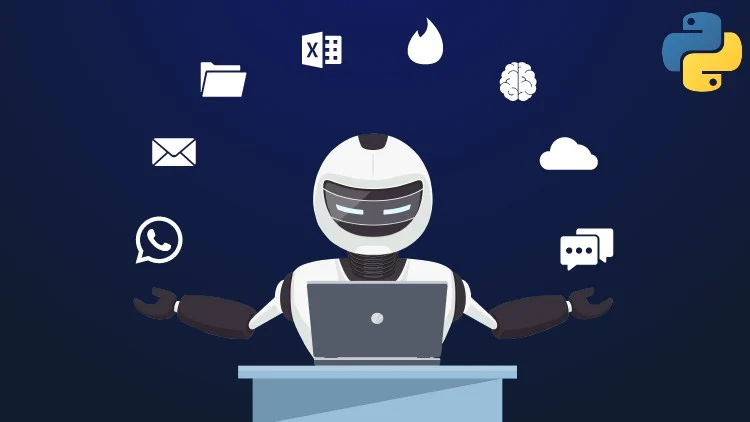
September 04, 2025
How to Automate Daily Tasks with AI and Python in 2025
How to Automate Daily Tasks with AI and Python in 2025
Ever felt overwhelmed and wished you could clone yourself to finish your to-do list? Imagine having AI and Python perform the hard work in 2025. From email management to social media automation, task automation is transformative. AI and Python can automate everyday activities, giving you time for more essential responsibilities. So are you ready to master productivity? Let's do it!
The Power of Python for Automation
Why Python? Python is a developer's Swiss army knife, particularly for automation. The language is easy to read, therefore you do not need coding skills. Its enormous libraries can automate web scraping and file management.
Imagine automating time-consuming and less important tasks with a few lines of code. Python's simplicity and capability make it the automation language of choice for beginners and experts. Without even mentioning all of the libraries, Selenium for web scraping, Pandas for data processing, schedule for job scheduling, Python provides everything you need to automate your life. Let's see how you can start!
Leveraging AI in Automation
Let's add AI into the play. Python performs the hard work, while AI improves everything. Imagine AI understanding normal language or making pattern-based predictions. Imagine automating both basic activities and decision-making!
AI lets you build systems that learn, adapt, and improve. AI can boost automation via machine learning models and predictive analytics. AI can automate email responses, propose meetings based on your schedule, and analyse data patterns without your input. Automation becomes smarter, more dynamic, and more efficient with AI. Additionally, OpenAI's GPT, IBM Watson, and Google AI are more available in 2025. This implies life automation is limitless!
Tools and Libraries for Automating Tasks with Python
How do you use Python and AI to handle tasks? Let's look at some important libraries and tools that make it possible. Firstly, Python has a great set of librabries.
- Selenium: Selenium is the best tool to use if you want to turn web browsing into a script. Selenium makes it easy to do things like getting files, filling out forms, and scraping data.
- BeautifulSoup: This is another great tool for web scraping; it lets you read HTML and get information from websites that you need.
- Pandas: Pandas is the best tool for handling data tasks. It works great for cleaning, transforming, and searching for data from databases or files.
- TensorFlow & scikit-learn: These tools can help you make machine learning models that can predict, sort, and even learn from data. You can use them to add some AI magic to your scripts.
Here is a simple example of how to use Selenium to download a report from a website automatically:
from selenium import webdriver
driver = webdriver.Chrome()
driver.get('https://example.com')
download_button = driver.find_element_by_id('download')
download_button.click()
driver.quit()When you run this script, Chrome will open, go to a website, click a download button, and then stop. One simple line of code can handle that job!
Real-Life Examples of Task Automation with AI and Python (150 words)
Let's talk about how AI and Python can make your daily life easy by automating things that you do in real life. Here are some examples:
- Automating Email Responses: You can use AI, such as OpenAI's GPT models, to write email responses automatically in reaction to certain queries or events. AI will handle your answers, so you do not have to.
- Social Media Automation: Do you want to post on social media without having schedule each post manually? Python tools like schedule and Tweepy (for Twitter) can arrange posts for you automatically based on what you want.
- Task Scheduling: You can use Python's schedule library to work with your calendar and organise tasks like setting up meetings, sending out daily reports, and even task scheduling.
- Personal Assistant: Make your own personal assistant by combining AI with Python. It might help you keep track of emails, organise meetings, and remember to do important things during the day.
AI-based automation does not just save time; it also gives you more power and lets you focus on more important tasks. What is even better? All of this is easier to set up with Python than you think!
How to Build Your Own Task Automation Script
Let's do something real! You can use Python and AI to make your own automatic scripts. Here's a simple example. Imagine being able to set the weather to update itself every morning so you do not have to.
Here's how to get weather information and set up a daily weather check:
import requests
weather_api = 'https://api.openweathermap.org/data/2.5/weather'
city = 'London'
api_key = 'your_api_key'
response = requests.get(f'{weather_api}?q={city}&appid={api_key}')
data = response.json()
print(f'The weather in {city} is {data["weather"][0]["description"]}')This script gets information about the weather and prints it. You could set this to run every morning, and it would give you the daily report without you having to check the weather app.
Challenges and Best Practices for Task Automation
Even though technology is great, it does come with some problems. It is important to test carefully and track performance so you can fix bugs in your scripts and make sure your AI model does not make bad choices.
A few best practices:
- Start small: Before handling bigger, more complicated processes, start with easy jobs.
- Test regularly: Check to see if your system is working the way you want it to and make changes as needed.
- Monitor AI behavior: AI can learn and change over time, so keep an eye out for any odd patterns or results.
Keep in mind that technology should make your life easier, not harder!
Conclusion
By 2025, AI and Python have made it possible to automate your daily tasks. It is also simple and easy to do. You can do anything, from sending emails automatically to running reports. Start small, try different things, and see how automation can help you get more done and spend more time on important things.
882 views
